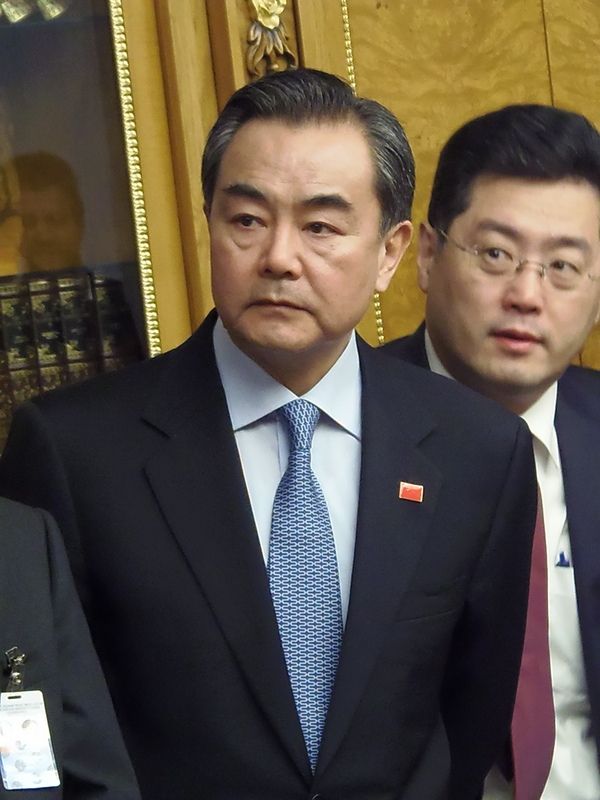 The new government needs to clearly insist on diplomatic reciprocal arrangements with China. While reciprocity is a function of power in bilateral relations, the Modi-led government's responses should be based on India'S inherent strengths, says China expert Srikanth Kondapalli.
The new government needs to clearly insist on diplomatic reciprocal arrangements with China. While reciprocity is a function of power in bilateral relations, the Modi-led government's responses should be based on India'S inherent strengths, says China expert Srikanth Kondapalli.
China's Foreign Minister Wang Yi will visit New Delhi on June 8-9 as President Xi Jinping's special envoy to greet and familiarise with the new government led by Prime Minister Narendra Modi and External Affairs Minister Sushma Swaraj. This decision to send Wang was taken following Premier Li Keqiang's 25-minute encouraging phone call on May 29 with Modi.
As the head of the foreign ministry, Wang is tasked to warm up to the new government in the diplomatic and strategic fields, given the fast changing dynamics at the global and regional levels and in the backdrop of the Ukrainian and South China Sea events.
Moreover, at the bilateral level, Wang has to seek active interest of the new dispensation for the twin celebrations for this year of friendship and the 60th anniversary of the enunciation of the Panchsheel principles by India, China and Myanmar.
China's media suggests that Wang is likely to pitch for the new Indian foreign minister to take part in the June 28 celebrations in Beijing to commemorate Panchsheel formulations. China had already invited leaders of Myanmar for this occasion.
Wang is no stranger to India, having dealt with New Delhi in his more than three decade career at the foreign ministry, where he served in different capacities at the Asian affairs department. Wang specialised on Asia, with focus on Taiwan and Japan as well. His negotiating skills with Southeast Asian nations in formulating the Declaration on South China Sea in 2002 is specifically noted.
Wang has visited India before, more recently for the November 2013 India-Russia-China meeting and the Asia-Europe meeting. Earlier, he accompanied Premier Li Keqiang to India on the latter's maiden overseas visit in May 2013. This experience in interacting with Indian leaders should serve Wang in good stead next week on a number of issues.
Firstly, one of Wang's priorities, besides gauging the new government's foreign policy directions, is to prepare for the 6th BRICS (Brazil, Russia, India, China, South Africa) summit meeting next month at Fortaleza in Brazil. Responses towards Ukraine, the BRICS Development Bank, restructuring of the international financial institutions, climate change and others need to be discussed and formalised. China is seeking a bigger profile on these issues.
Secondly, Wang will be looking for coordinated responses with India at the 9th meeting of the G-20 heads of government at Brisbane in Australia in mid-November given the Western countries posture of trade protectionism or diverting financial resources away from developing countries. As China's exports continue to be affected by the side effects of the global financial crisis, the foreign minister is tasked with eliciting support from other countries.
Thirdly, the 9th East Asian Summit meeting is due in Naypyidaw, Myanmar on November 11-12 this year. The foreign ministries of China and India have recently initiated a dialogue process given the widening divergences in their respective stances on freedom of navigation, United Nations laws and overall stability and prosperity of the region.
Specifically, India views with concern China's foreign ministry spokeswoman Hua Chunying's comment of May 12 that India need 'not worry too much about the current situation in the South China Sea.' If China continues its spate in the region, half of Indian trade that passes through this region will be in jeopardy.
While the above multilateral fora provide a venue for Xi Jinping and Modi to meet and discuss bilateral relations, substantial diplomatic negotiations will have to wait till both leaders meet in New Delhi at the end of this year.
Wang's overall priorities is expand China's diplomatic space given his country's perceptions about the United States 'rebalance' towards the Asia-Pacific region and emergence of a 'normal' Japan. While China had tried to counter the US rebalance through the new initiative of reviving the continental and maritime Silk Roads, ironically these roads pass through dispute sovereignty areas.
However, China intends to convey, during this visit, that both China and India could coordinate and cooperate at the international and regional levels and at the multilateral institutions. Of course, Beijing is silent on any major progress on 'core' issues in bilateral relations with New Delhi. This has been China's stance for the past six decades.
The new government needs to take a call on this 'united front' message from Beijing and clearly insist on diplomatic reciprocal arrangements with China. While reciprocity is a function of power in bilateral relations, the Modi-led government's responses should be based on India's inherent strengths and geo-strategic advantageous positions.
Srikanth Kondapalli is a professor in Chinese studies at the Jawaharlal Nehru University, New Delhi.










